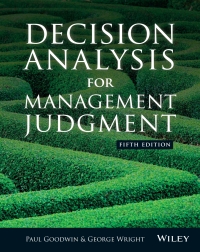(5) A building contractor is submitting an estimate to a potential customer for carrying out some construction...
Question:
(5) A building contractor is submitting an estimate to a potential customer for carrying out some construction work at the customer’s premises. The builder reckons that if he offers to carry out the work for $150 000 there is a 0.2 probability that the customer will agree to the price, a 0.5 probability that a price of $120 000 would eventually be agreed and a 0.3 probability that the customer will simply refuse the offer and give the work to another builder. If the builder offers to carry out the work for $100 000 he reckons that there is a 0.3 probability that the customer will accept this price, a 0.6 probability that the customer will bargain so that a price of $80 000 will eventually be agreed and a 0.1 probability that the customer will refuse the offer and take the work elsewhere.
(a) Determine which price the builder should quote in order to maximize the expected payment he receives from the customer.
(b) Suppose that, after some questioning, the builder is able to make the following statements:
I am indifferent between receiving $120 000 for certain or entering a lottery that will give me a 0.9 probability of winning $150 000 and a 0.1 probability of winning $0.
I am indifferent between receiving $100 000 for certain or entering a lottery that will give me a 0.85 probability of winning $150 000 and a 0.15 probability of winning $0.
I am indifferent between receiving $80 000 for certain or entering a lottery that will give me a 0.75 probability of winning $150 000 and a 0.25 probability of winning $0.
(i) Sketch the builder’s utility function and comment on what it shows.
(ii) In the light of the above statements, which price should the builder now quote to the customer and why?
Step by Step Answer:

Decision Analysis For Management Judgment
ISBN: 9781118740736,9781118889251
5th Edition
Authors: Paul Goodwin , George Wright




